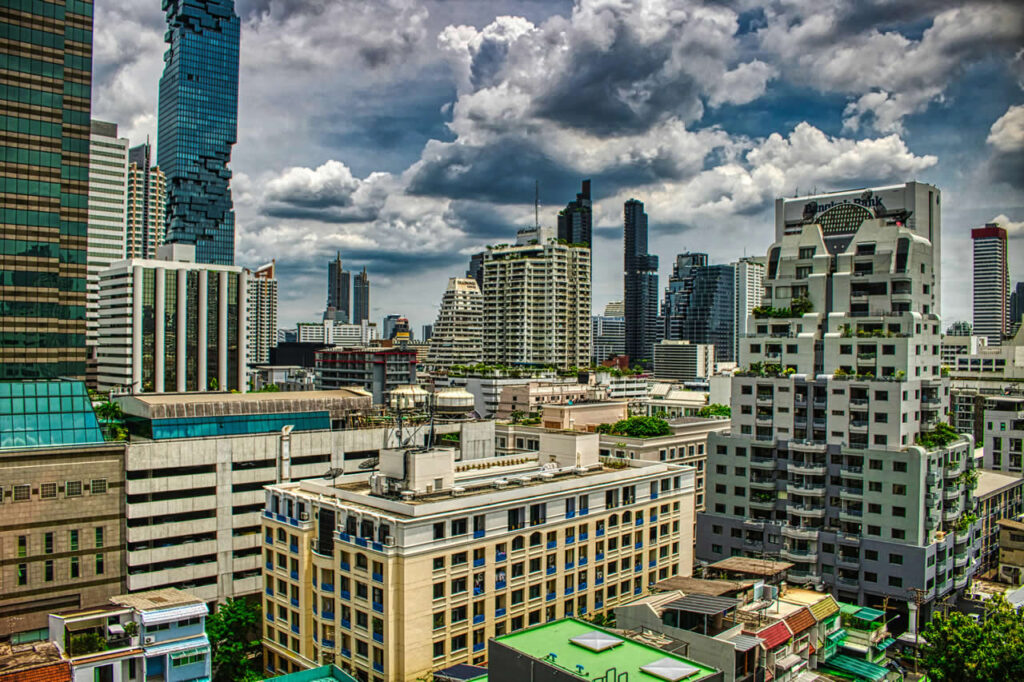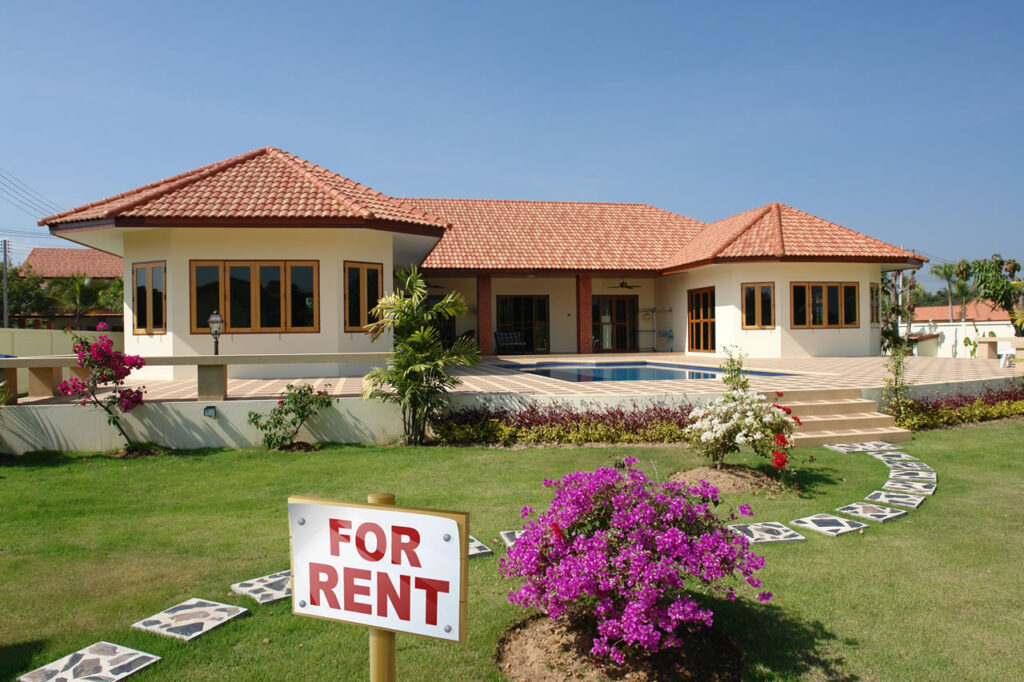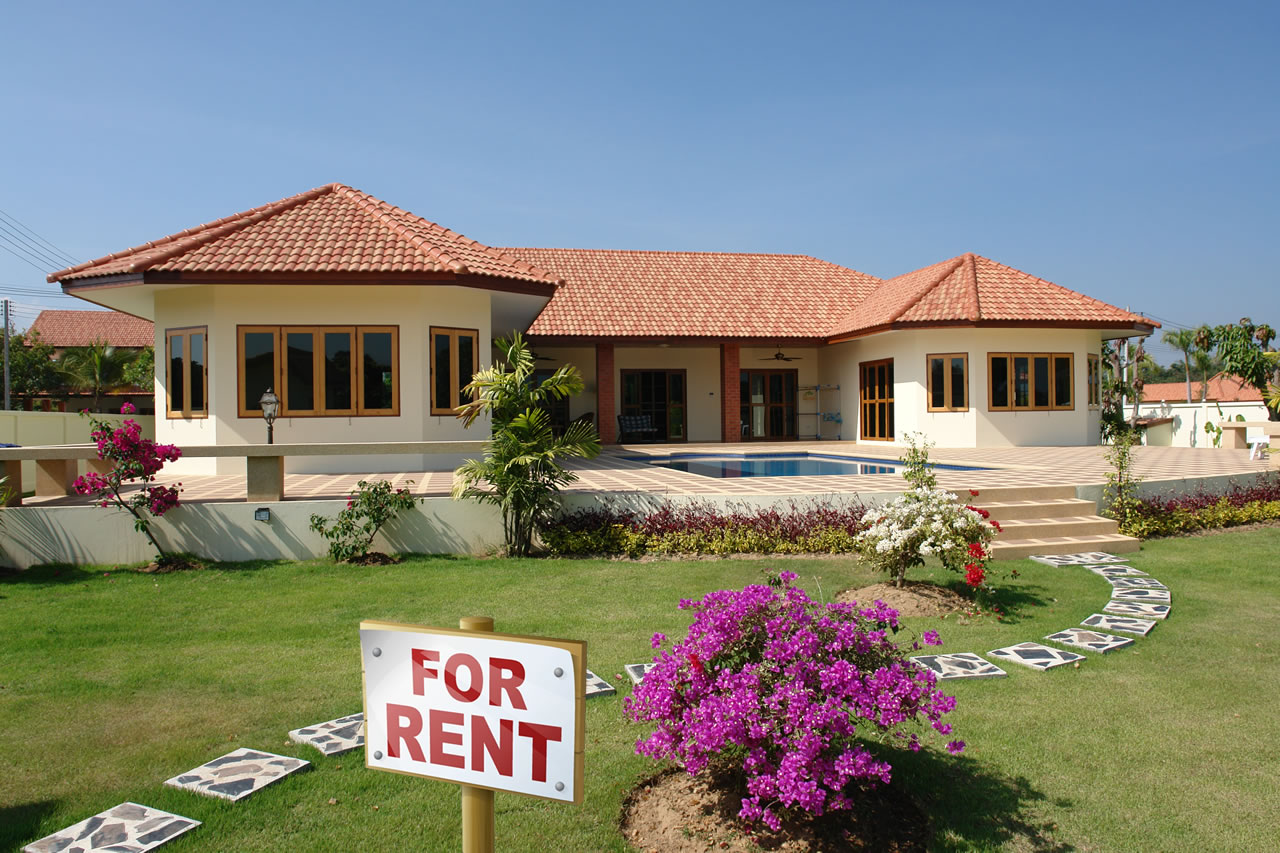Renting a home is a substantial step, whether you’re moving for work, retirement, or just a long stay in Thailand. But understanding lease agreements, deposits, and finding a trustworthy landlord is a task not be underestimated. This guide covers everything you need to know to rent a condo or house in Thailand without headaches.
What You Need to Rent a Home in Thailand
Renting a condo or house in Thailand is relatively straightforward, but you’ll need to prepare a few essential documents and payments in advance. Here’s what most landlords require:
- A valid passport – This serves as your primary identification and will be copied for lease agreements.
- A Thai visa – You can rent a condo on almost any visa type, including tourist, retirement, work, education, or marriage visas. Some landlords may prefer tenants with longer-stay visas.
- A security deposit – Typically, landlords ask for 1–2 months’ rent as a security deposit, which is refundable upon move-out (minus any damages or unpaid bills).
- The first month’s rent in advance – Before moving in, you must pay the first month’s rent upfront.
- A signed lease agreement – This contract outlines the rental terms, responsibilities, and conditions for both the tenant and landlord.
Additional Requirements (Occasionally Requested):
Some landlords may ask for additional proof of stability, though this is not always necessary. Possible extra requirements include:
- Proof of income – Some landlords request bank statements or proof of employment to ensure you can cover rent.
- A work permit – If you’re employed in Thailand, a work permit may be required for long-term leases.
- References from previous landlords – This is uncommon but may be requested by more cautious property owners.
If you’re renting through an agent, they can guide you through these requirements and help smooth over any paperwork issues.
Apartments vs. Condos: What’s the Difference?
While terms like apartment, flat, and condo are often used interchangeably in other countries, in Thailand, there are distinct differences between ‘Apartments’ and ‘Condos.
Condos (Condominiums)
- Privately owned units within a larger residential building.
- Lower utility costs – Electricity and water are charged at government rates, making them more affordable than apartments.
- Fully furnished – Most come with basic furniture and appliances (TV, fridge, microwave, sofa, and bed). However, linens, kitchenware, and other small necessities may not be included.
- More flexibility in negotiations – Since each unit has a different landlord, you can often negotiate rent, furnishings, and contract terms.
- Better for long-term rentals – Most landlords prefer tenants who commit to 12 months or longer, though some may agree to 6-month leases.
- Common facilities – Most condos offer pools, gyms, parking, and security, but amenities vary by building.

Apartments
- Owned by a company – Unlike condos, apartments are managed by a single entity rather than individual landlords.
- Higher utility costs – Many apartments charge electricity and water at inflated “building rates” rather than the government rate.
- Offer hotel-like services – These may include reception desks, cleaning services, laundry, and 24/7 maintenance support.
- More flexible rental terms – Apartments often allow short-term rentals, making them ideal for stays of 1 to 3 months.
- Standardized management – Since all units are managed by the same company, maintenance and policies are consistent across the building.
Condos vs Houses
Both choices come with their own set of considerations, what works best for you depends on your lifestyle and budget.
Condos
Many condos are located in the heart of cities like Bangkok, Chiang Mai, and Pattaya, close to BTS/MRT stations, malls, and nightlife. Most condominium buildings offer amenities such as a swimming pool, gym, and security, usually all included in the rent.
A flat is less maintenance than a house, and repairs are often handled by the building management. Gated access, security guards, and CCTV offer peace of mind. This is a very convenient lifestyle, especially for a single person. If the above ticks all your boxes, a condo is probably best for you!


Houses
A house is usually much bigger than a flat, offering more living space, including multiple bedrooms & bathrooms. Many properties are appointed with a garden & outdoor sitting area, and depending on your budget, you also can have a private pool.
If you have pets such as dogs and cats, a house is definitively preferable, as most condos have strict no-pet policies. You have more privacy and flexibility to decorate your living space and garden in your own style. Ideal for families and individuals who value space over convenience. What are your priorities?
I can see why someone appreciates the convenience of living in a condominium with security and close to amenities. Personally, I prefer a house over a condo. Most of my time is spent at home, and a house with a garden and pool just feels much better to me.
The only drawback is the distance to town, but I don’t mind the half-hour drive. Also, in my opinion, a house offers much better value for money. For the rent I pay for a 4-bedroom house, I would only get a 2-bedroom flat in town.
Everybody has different requirements and preferences – I wish you’ll find your dream home in Thailand!
Rental Rates & Lease Terms
Standard Lease Period
The majority of landlords prefer 12-month leases, as they provide stability and reduce tenant turnover. This is the most common rental term for condos and houses in Thailand.
Short-Term Rentals
- While 6-month leases are sometimes available, they are less common and often require higher rent.
- 3–4 month rentals are possible in some cases but are best found through serviced apartments, Airbnb, or month-to-month rental platforms.
- If you need extreme flexibility (1–2 months), your best bet is serviced apartments, co-living spaces, or short-term condo rentals on Airbnb.
Deposit & Advance Payment
Most landlords require upfront payments before allowing you to move in. These typically include:
- 1–2 months’ rent as a security deposit (refundable at the end of the lease, minus damages or unpaid bills).
- First month’s rent paid in advance.
- Some landlords may ask for an additional booking fee (equivalent to one month’s rent) to reserve the unit before signing the lease.
Can You Negotiate Rental Terms?
Yes! If you’re staying long-term, you may be able to negotiate:
- A lower monthly rent – Landlords are more flexible for leases of 18–24 months.
- Extra furniture or appliances – Ask for additional items like a washing machine, TV, or better mattress.
- Waiving certain fees – Some landlords might agree to reduce or waive cleaning or minor maintenance fees.
Extra Costs to Consider
When renting in Thailand, tenants are responsible for additional costs beyond just rent. These may include:
Utility Bills
- Electricity – Usually charged per unit (kWh). Condo rates are lower as they follow government pricing (4-5 THB per kWh), while some apartments charge higher “building rates.”
- Water – Generally inexpensive, with government rates around 20–30 THB per cubic meter.
- WiFi & Internet – Most condos do not include WiFi. Expect to pay 500–1,200 THB per month for a home internet package.
- Cable TV – Optional, with packages ranging from 300–1,000 THB per month, depending on the provider.
Maintenance & Cleaning Costs
- Air conditioning maintenance – It’s recommended to clean A/C units every 3–6 months, costing 500–1,500 THB per unit.
- General cleaning services – Available for 300–1,000 THB per session.
Tenant Responsibilities
- Minor repairs (under 1,000 THB) are usually covered by the tenant (e.g., lightbulbs, minor plumbing issues).
- Major repairs (above 1,000 THB) are typically the landlord’s responsibility, such as broken appliances.
📌 Managing rent, deposits, and monthly bills is a lot smoother when your finances are in order. See my full guide to Banking & Financial Tips for Expats in Thailand for smart ways to set up your accounts, transfer funds, and avoid common money traps— and check the Cost of Living in Thailand guide to see how these expenses fit into your overall monthly budget.

Pet-Friendly Accommodation
Many landlords are reluctant to accept tenants with pets. Finding a pet-friendly condo can be a real challenge because many condos and apartments have strict no-pet policies.
However, house owners are much more flexible regarding allowing pets (cats and dogs), and you shouldn’t have a problem locating a suitable home.
Pet-Friendly Rental Options:
- Older condos – Some older condominium buildings are more lenient with pet policies, especially if the landlord is open to negotiations.
- Serviced apartments – A few upscale serviced apartments allow pets, though they may charge extra cleaning fees.
- Houses – Renting a house is often the best solution, as many landlords are more flexible about pets.
📌 Bringing Your Pet To Thailand? Here’s What You Need To Know: Paws & Passports – Requirements, Documentation, Vaccinations, Costs, Customs
Things to Keep in Mind:
- Always check your lease agreement – Even if a landlord verbally agrees to allow pets, ensure this is written in the contract to avoid disputes.
- Size and breed restrictions – Some properties only allow small pets or have restrictions on certain breeds.
- Additional deposits or cleaning fees – Landlords may request an extra deposit or higher cleaning fees for pet-related wear and tear.
- Be upfront with your landlord – Trying to hide a pet can result in eviction or fines if discovered.
Renting a place is just the beginning—what’s it really like to live here full-time? Before making your move check out this genuine guide ===> The Pros and Cons of Living in Thailand as an Expat
Finding Rentals & Using Agents
There are several ways to find rental properties in Thailand, from online listings to real estate agents and even old-fashioned legwork. Here are your best options:
Online Platforms
Websites and Facebook groups are among the most popular ways to find rentals. Some of the top platforms include:
- DDproperty – One of Thailand’s largest property websites with listings for condos, houses, and apartments.
- Hipflat – Another popular site offering real estate listings with detailed pricing trends.
- BahtSold – A classified ad website with a variety of rental listings.
- Facebook Groups – Many expat communities have dedicated groups where landlords and agents post available rentals.
Using a Real Estate Agent
Real estate agents can help you find, negotiate, and secure rental properties. However, keep in mind:
- No licensing is required for agents in Thailand – Always check their credibility before working with them.
- Agents are paid by landlords – Tenants typically do not pay any commission or fees.
- Agents can help with contracts and negotiations – They can assist with lease agreements, ensuring fair terms.
DIY Search (Driving/Walking Around)
Another option is to drive around in your preferred neighborhood and look out for “For Rent” signs, which usually have a contact number, and you can talk directly to the owner or agent.
Many condominium buildings have a community board offering available units for rent, and you can ask staff at the reception desk.
Rental Process
Search & Viewings
- Research different neighborhoods and decide on your budget.
- Browse listings on property websites or Facebook groups.
- Contact landlords or real estate agents to schedule viewings.
- Visit multiple properties to compare options before making a decision.
Offers & Negotiation
- Discuss rental price, move-in date, and lease duration with the landlord.
- Ask if any furniture, appliances, or utilities can be included in the rent.
- Negotiate terms such as deposit amount or minor renovations.
Booking & Signing Preparation
- Pay a booking fee (typically one month’s rent) to secure the unit.
- Review the lease contract carefully before signing.
- Confirm details like maintenance responsibilities and termination clauses.
Signing & Move-in
- Sign the lease agreement with the landlord or agent.
- Pay the first month’s rent + 2-month security deposit.
- Request and keep receipts for all payments.
- Inspect the unit before moving in and document any existing damages.
Tenancy & Check-out
- Report maintenance issues promptly to the landlord or condo management.
- Keep records of rent payments and communication with the landlord.
- When moving out, ensure the unit is clean and return all keys.
- The security deposit is refunded within 30 days, minus any deductions for damages.
📌 Following these steps should help to ensure a smooth process and avoid any bigger problems.

Negotiating Lower Rent
Rent prices are often not set in stone in Thailand, so negotiation is common. If you want to score a better deal, try these tactics:
Commit to a Longer Lease
- Landlords prefer stability. If you’re willing to sign a longer lease (18–24 months), they may offer a discount. Some landlords reduce rent by 5–10% or more for long-term tenants to avoid frequent turnover.
Offer to Pay Several Months Upfront
- If you have the cash, paying 3–6 months in advance can be a very strong bargaining tool! This reassures the landlord that you’re a reliable tenant and may result in a lower monthly rent.
Negotiate for Extras Instead of a Lower Rent
- Some landlords may not want to reduce rent but are open to including extras. Instead of haggling over price, ask for free WiFi, a better mattress, or additional furniture.
Compare Multiple Listings
- If you’re looking at several condos, mention that you’re considering other units. Landlords might lower their price if they know you have other options.
Use Seasonal Leverage
- Rent prices in Thailand fluctuate with demand. Low season (April–October) is a great time to negotiate since landlords have fewer tenants. High season (November–March) is more competitive, making negotiations harder.
Ask to Waive Fees Instead
- If a landlord won’t lower the rent, try negotiating on extra costs instead. Ask if they’ll waive maintenance fees, security deposits, or cleaning fees. Some landlords may agree to free air-conditioning servicing or a monthly cleaning service.
Be Polite and Build Rapport
- Thai landlords appreciate respect and politeness. A friendly and patient approach goes further than aggressive bargaining. Express genuine interest in taking good care of the property, which may make them more flexible.
Property Maintenance & Responsibilities
Conditions might differ from your home country and when renting in Thailand, it’s important to understand who is responsible for repairs and maintenance. This depends on the lease agreement, but general guidelines include:
Tenant’s Responsibilities:
- Minor repairs (under ฿1,000) – Tenants are expected to cover small maintenance issues such as:
- Replacing light bulbs.
- Regular air-conditioning cleaning (usually required every 3–6 months to avoid damage).
- Fixing minor wall scuffs or curtain stains.
- Basic plumbing maintenance (e.g., unclogging sinks if it’s due to tenant use).
- Regular cleaning – Tenants are responsible for keeping the unit in good condition.
- Paying utility bills on time – Water, electricity, and WiFi bills must be paid monthly to avoid disruptions.
Landlord’s Responsibilities:
- Major repairs – The landlord is responsible for fixing major issues, such as:
- Plumbing problems (leaks, broken pipes, or serious drainage issues).
- Electrical problems (power failures, faulty wiring).
- Replacing or repairing broken appliances (fridge, air conditioning unit, washing machine, etc.), unless damage is caused by tenant misuse.
- Structural issues – Damage to walls, ceilings, or floors due to normal wear and tear should be covered by the landlord.
- Building maintenance fees – If renting a condo, the landlord typically covers the common area maintenance fees.
Condo Management Assistance:
If you’re renting in a condominium, the building management office may help with:
- Minor repairs (fixing leaks, unclogging drains, replacing small fixtures).
- Booking maintenance services (for air-conditioning cleaning, pest control, etc.).
- Security concerns – If you experience issues with locks, parking, or disturbances, the condo management can assist.
Tips for Handling Maintenance Issues:
- Report problems immediately – Delaying a repair can make things worse, and in some cases, the landlord may hold you responsible for additional damage.
- Keep communication in writing – Whether using LINE, email, or a messaging app, document all maintenance requests and landlord responses. This helps if there’s a dispute later.
- Clarify maintenance terms in the lease – Before signing, make sure your lease states who is responsible for what repairs to avoid unexpected costs.
Final Tip:
If a landlord seems hesitant to take responsibility for major repairs, consider adding a clause in the lease specifying what repairs they must cover.
A well-documented agreement ensures both parties are on the same page and prevents misunderstandings.
Check-out & Deposit Refund Process
This procedure can sometimes cause trouble if not handled correctly. By following these steps, you can prepare for a hassle-free move-out and get back your full deposit without unfair deductions:
Notify Your Landlord in Advance
- Give at least 30 days’ notice before your move-out date, as required by most lease agreements.
- Check your lease to confirm if a longer notice period is needed.
- Notify your landlord in writing (email, LINE, or text) to keep a record of your notice.
Prepare for an Inspection
Most landlords will inspect the unit before returning your security deposit. To ensure you pass the inspection:
- Deep clean the unit – Floors, walls, bathrooms, and appliances should be cleaned.
- Fix minor issues – Replace light bulbs, clean air-conditioning filters, and patch up small holes in the wall.
- Remove all personal belongings – Leaving behind unwanted furniture or appliances may lead to disposal fees.
- Check the inventory list – If your rental came furnished, make sure all items (chairs, table, remote controls, etc.) are accounted for and in good condition.
Return All Keys & Access Cards
- Ensure you return all keys, keycards, remote controls, and parking passes.
- Some landlords charge a fee for lost keys or unreturned items.
Security Deposit Refund Process
- Standard timeframe – Your security deposit should be refunded within 30 days after moving out.
- Deductions may apply – Landlords can deduct costs for:
- Unpaid utility bills (electricity, water, internet).
- Damages beyond normal wear and tear (broken furniture, severe wall stains, or unapproved modifications).
- Deep cleaning fees (if the apartment is left in poor condition).
- How to avoid deductions:
- Keep copies of your last utility bill payments.
- Repair minor damage before moving out.
- Ensure the unit is left in good condition.
Protect Yourself: Take Photos & Videos
Before handing back the keys, take clear photos and videos of the entire unit to:
- Document the condition upon move-out.
- Avoid unfair deposit deductions.
- Have proof in case of disputes with the landlord.
Final Tip:
If your landlord is delaying or refusing to return your deposit without a valid reason, politely remind them in writing. If necessary, you can seek assistance from the condo management office or legal advisors in Thailand.
➡️ Thinking long-term? Check out our complete guide on how to buy property in Thailand as a foreigner, including what you can legally own and how to avoid costly mistakes.
Conclusion
Choosing a place to live is a rather big decision, but the range of available accommodation in Thailand is plentiful and affordable. Take your time to look around; check out different neighborhoods and buildings before you commit.
Talk to fellow expats; they often know about good housing opportunities and might be able to help. There’s something available for every taste and budget. By following these guidelines, you shouldn’t have a problem finding a suitable home. Happy House Hunting!
Have you rented a condo or house in Thailand? What was your experience like? Share your tips, challenges, or any questions in the comments below! Your insights could help fellow expats and travelers navigate the Thai rental market more smoothly.

